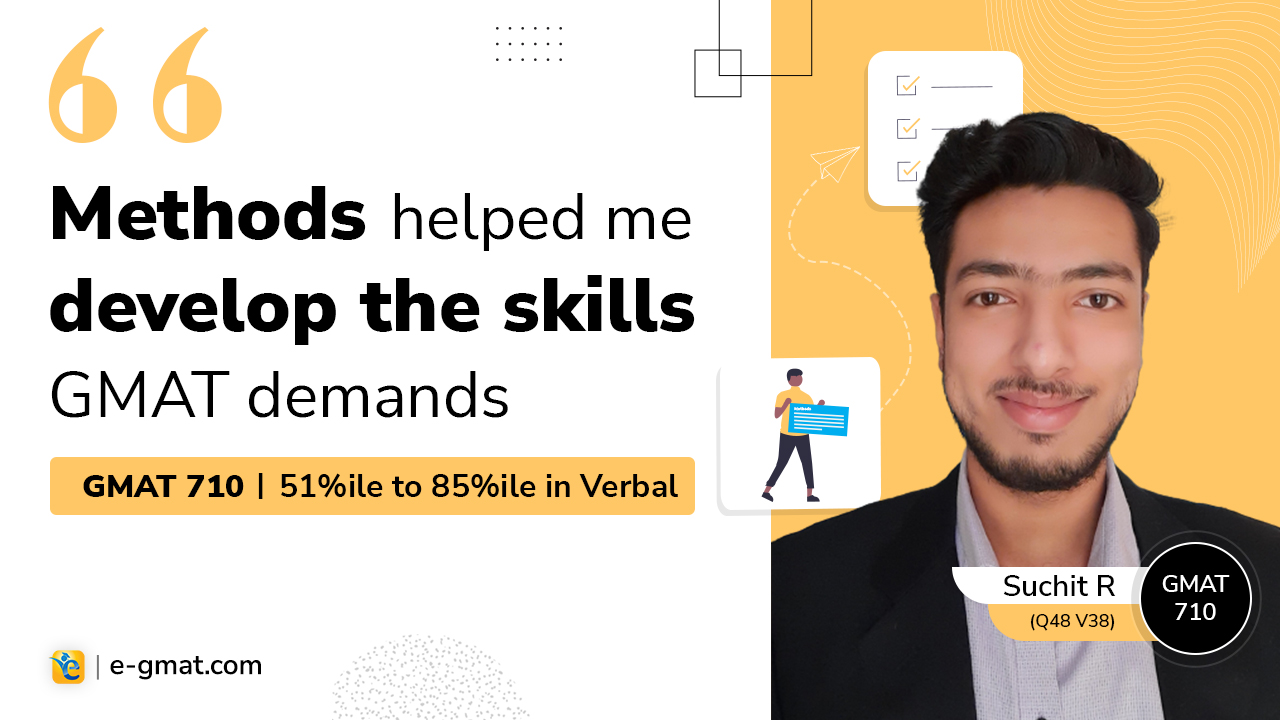One is seldom successful without a good plan. One is rarely, if ever, successful without the discipline and determination to go through with that plan.
Suchit scored a 640 in his first GMAT attempt, but his target was clear to him – nothing less than a 700 would do. After this attempt, he have realized that he needed something more than the free resources he had used so far in his GMAT preparation. With a very clear intent to not repeat any of his past mistakes, he embarked on an attempt to build his abilities to the needed levels. He was determined to maintain the discipline he knew was necessary to ace a test like the GMAT.
Another realization struck him when he only scored a 650 in mocks he attempted even after completing the e-GMAT course (he got this score twice!) – he was still not where he needed to be. At this point, a detailed analysis of his performance by his mentor made him realize that he’d rushed through the course and missed following the structure, which is a crucial aspect of the course. Despite this, with the constant guidance from his mentor and the study plan crafted specially for him, he was able to compensate for all his previous mistakes and improve his score by 70 points on his final GMAT attempt, resulting in a 710 GMAT score (finally breaking the 700 barrier!).
Watch Suchit share his experience with GMAT preparation and how learning the methods helped him go from the 51st percentile to the 85th percentile in verbal.
Suchit’s GMAT Preparation Journey & Learning experience
Abha: Congratulations Suchit! Tell us about your first reaction when your GMAT score 710 flashed on your screen.
Suchit: I was calm and confident. I had the feeling that it is going to be alright. When it was time to see the results, it was all working out well for me at that time, I was not nervous. When the result 710 flashed on my screen I was happy that my hard work from last couple of months has paid well as I had hit my target score. It was not surprising at all. It felt really good.
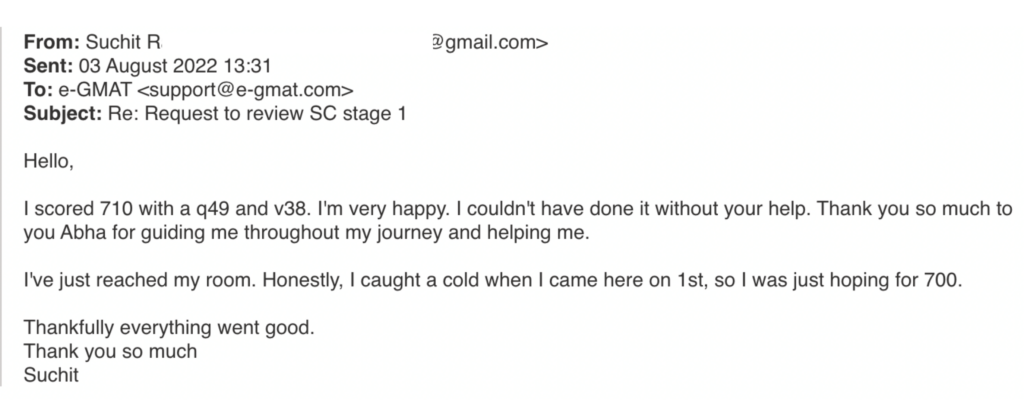
Initial experience with the e-GMAT course and mentorship program
Abha: When did you start preparing seriously for GMAT?
It was my second attempt; I did not prepare with any course for my first attempt in December last year. I took help from Official Guides, both verbal and quant, and I’d solve questions from there. Occasionally I’d look up videos on topics I did not know much about. I did not prepare much for my first attempt; I studied for one and a half months before I gave my first GMAT, where I scored 650 (v28, Q48). Again, this was not surprising as my mock scores were also around 630-640.
But after that, I decided to prepare seriously for my next attempt. It was okay for the first time to score low as I did not know much about the test. I realized the need for external help, and then I started looking for GMAT courses. When I looked up GMAT videos on YouTube, some of the top videos were from e-GMAT, and that’s how I learned about e-GMAT. I emailed the support team and spoke to them regarding my GMAT prep plan. He took me through the course and helped me understand how to go about it. This happened in February, and I took the subscription to e-GMAT. May, June, and July, three months I prepared with the e-GMAT course.
I started with the course and followed it meticulously as directed by my mentor (Abha). You guided me on how to go about my preparations.
The first time, I made the mistake of not listening to anybody, but now I was sure you all knew much better about the GMAT; hence I followed as is.
While preparing for the first attempt, I would not review the official guide and attempted OG questions. But this time, I did not repeat my mistake, which had a great impact on my scores. After the review, I would get to know where I was going wrong and in which areas I had issues understanding the concepts.
Find out why e-GMAT is the best GMAT preparation course you need to hit your target score like Suchit. Start your Free Trial – https://e-gmat.com/ft-gmat-prep/
Free resources Vs e-GMAT
Abha : Suchit, when you reached out to us seeking help, you’d set your target, but you’d not decided your test date yet. We were still working on the improvement plan. As you said, during your prep for your first GMAT attempt, you prepared by yourself, referring to OG guides and OG questions. That preparation took you to GMAT 640 score. So, how was it different this time?
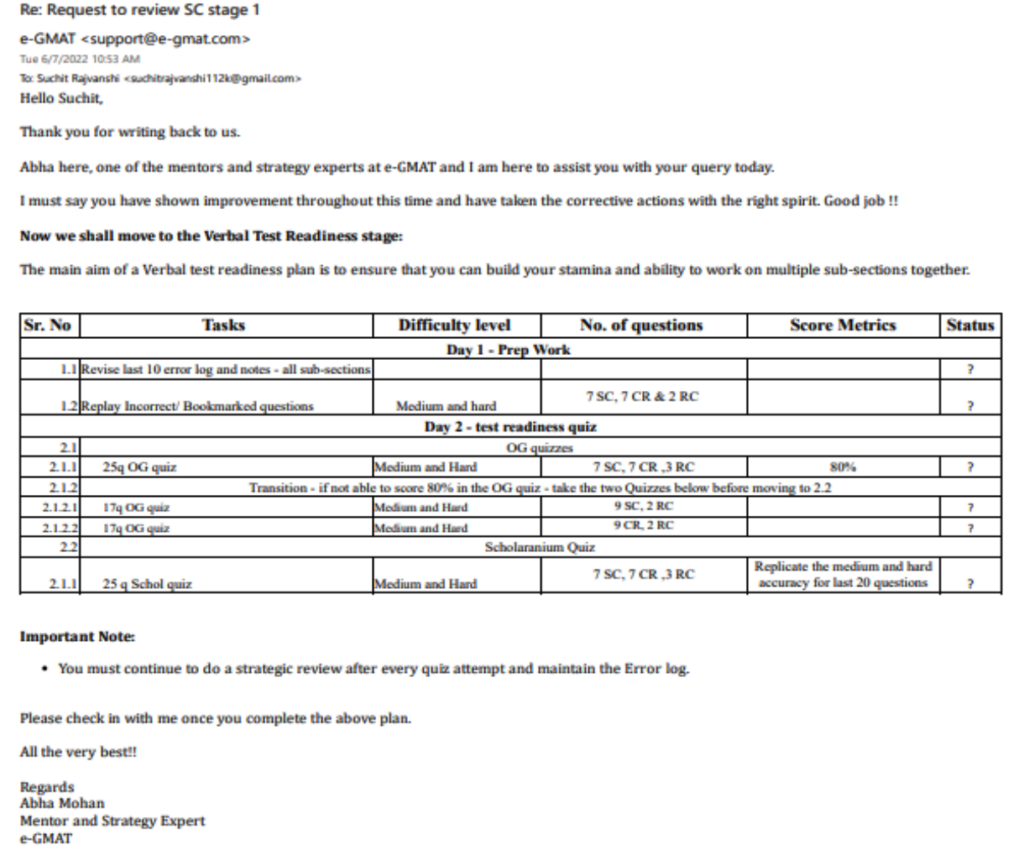
Suchit: It was primarily the learning approach and personalized study plan I’d received from e-GMAT. I was reasonably good at quant but struggling with verbal. There are different methods to solve different types of questions; e.g., inference questions require pre-thinking and for assumption questions, we have to come to a statement – if that is true; the conclusion also must hold true. There are specific suggested methods to solve each type; I was unaware of those earlier.
After taking the e-GMAT course and going through the module files, the first stage of the 3 learning stages, I started understanding how to approach questions and the methods I needed to apply.
That was different this time, besides the constant expert advice I got from you, my e-GMAT mentor. I used to write to you every 2-3 days to receive the email back from you with the right plan, highlighting the areas I was faltering in and guiding me with ways to improve.
It was all a very wholesome method that helped me a lot because GMAT is not about memorizing things; you need to develop the skills.
Role of strategic review and analysis
Abha: You started with e-GMAT in May and took your second attempt in August. It was three full months of time commitment. Though you’re a student, how much time were you spending on your GMAT prep daily?
Suchit: For the first two months of preparation, I was doing an internship. So after 5-6 hours of work, I would study for the GMAT for another 5-6 hours. But even in July, when my internship ended, I did not spend more than 6-7 hours a day. Since it was majorly revision time, I focused on my weak areas where I was faltering. I did the strategic review for questions I did not get correct and course revision as the last part of my preparation.
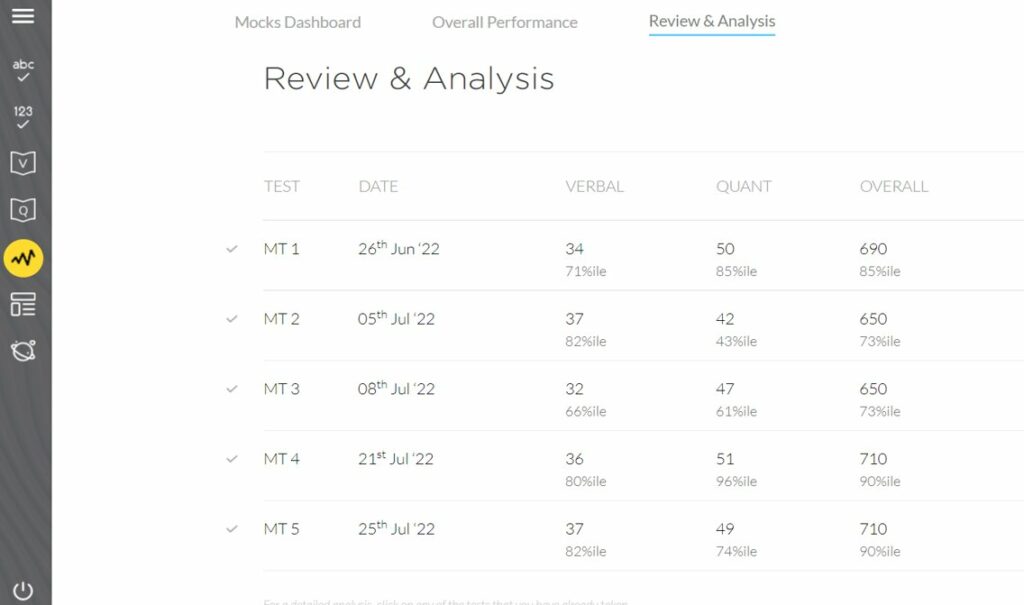
Abha: In the first two months, you spent 5-6 hours on concept building, whereas in the last month, for 6-7 hours a day, you were revising and doing practice quizzes. So when you say review, what type of quizzes are you talking about, those we have on the e-GMAT platform or mocks? How did you go about the strategic review?
Suchit: After attempting any quiz, I would strategically review all the wrong questions. I would pay close attention to my mistakes and correct them. I’d also try to understand what type of mistakes I am making, was there timing related issues or conceptual gaps? Once done with 3-4 quizzes, I’d do the custom quiz with all the incorrect questions from all the sections, SC, CR, and RC. I’d do them in practice mode to get to know the solution after each question. This exercise helped me in gauging the knowledge gaps I had. This was my practicing strategy.
Abha: I could not have agreed more. When you take a quiz and review it then and there, your approach to how you’ve attempted that question is fresh in your mind.
So, while navigating through the course and quizzes, there is a lot of information to absorb. Were you making notes?
Suchit: When I was in the first stage, I made a lot of notes, especially in Sentence Correction, because there were a lot of grammatical points in SC. On the other hand, for Critical Reasoning, there was not much in the concept learning, but I made notes for the questions, for example, the significance of certain words and how they can affect the answer choice or conclusion. So, I’d make notes for all those things so that if I come across those words again, I should know how to approach those questions.
Abha: So, you made notes and revised them regularly across all the sub-sections.
Concept cementing, a mistake to avoid.
Abha: How was your flow for each of the sub-sections in Verbal? As we already know, you were strong at quant.
Suchit: Actually, now I realize the mistake I made. Without taking any breaks, I would do one topic after another. I constantly tried to absorb the concepts and did not retain the conceptual learning. And that was the main reason I was not performing well in the quizzes later. I would do individual sub-section questions immediately after the concept learning when it was still fresh in my mind but not synced in properly yet. I would move to the next topic without taking any breaks. I should have taken the breaks to let the learning sync in well.
For the same reason, I think I faltered on every step after cementing. After you sent me those files, I realized I had forgotten the concepts. I should have gone easy.
Abha: You continuously focused on learning the concepts back-to-back for SC, CR, and RC without going through the cementing stage, which, if you had done, would have helped you strengthen the concepts.
Suchit: Absolutely. I thought I’d complete the course in two months and take the test, but it did not work out because my performance varied. But that last extra month I took helped me a lot to get back on track.
Abha: The best part about you as a candidate was that you were willing to work on every plan I shared. Once we made you understand your mistakes, you were open to correcting your errors, and that worked out well for you.
Suchit: I realized I was still faltering even though I was done with the course; it meant I was lagging somewhere. I would have just gone on completing the course in one go without actually understanding the reasons why I was faltering.
The plans and corrective measures shared by you really helped me, so I decided to follow them diligently.
How to approach GMAT mocks?
Abha: Mocks play a crucial role while preparing for the GMAT because they give a reality check and tell you where you are. Tell us about your approach with mocks. Did you make any corrections here?
Suchit: In the first two mocks, I scored 650 even after going through the entire course; the major problem was the timing. I was spending too much time on the first half of the verbal section, which left me with little time for the remaining questions. That’s one thing I was constantly going wrong with, again in the second attempt. But once I understood the real problem, I started to go through the quizzes again with the necessary timing corrections. While attempting the next mock, I wanted to ensure I did not repeat that mistake. The exam environment is critical while attempting the quizzes or mocks. If there is any background noise, I get disturbed, and that’s why I became careful of the test environment for my last few mock attempts, where I scored 710. I was very consciously putting my time into the mock tests.

Abha: When you faltered in two mocks earlier after completing the course, the problem was timing. As timing is so important, what was your strategy to improve that?
Suchit: Timing was a concern. I’d get stuck with 2-3 questions spending the maximum time and still get them wrong. I would keep trying and waste time, thinking I was just one step away from the correct answer. I was not strategic, and as you said, GMAT is like a sport where you have to build your skills and play strategically. Even in quant, after spending 3-4 minutes on a question, I’d have to accept any random answer and move on after wasting time. As you suggested, I should move on to the next question if I am not getting the path forward. I started following the plan that if I could not find the way ahead in 90 seconds, I’d move on without wasting further time. That worked well for me.
Verbal-Quant sequence, An important tip.
Abha: What was the sequence for quant and verbal that you were following? Was it the same all through your mocks and final GMAT exam?
Suchit: Yes, I always did the verbal first and the quant second because, for me, verbal was comparatively more difficult. It was best to do it with a fresh mind. I was more comfortable with quant and knew I could manage it after I was done with verbal.
Abha: That is the right approach. You knew your weaker section and decided to encounter it first with a fresh mind and kept quant, where you were strong, for later.
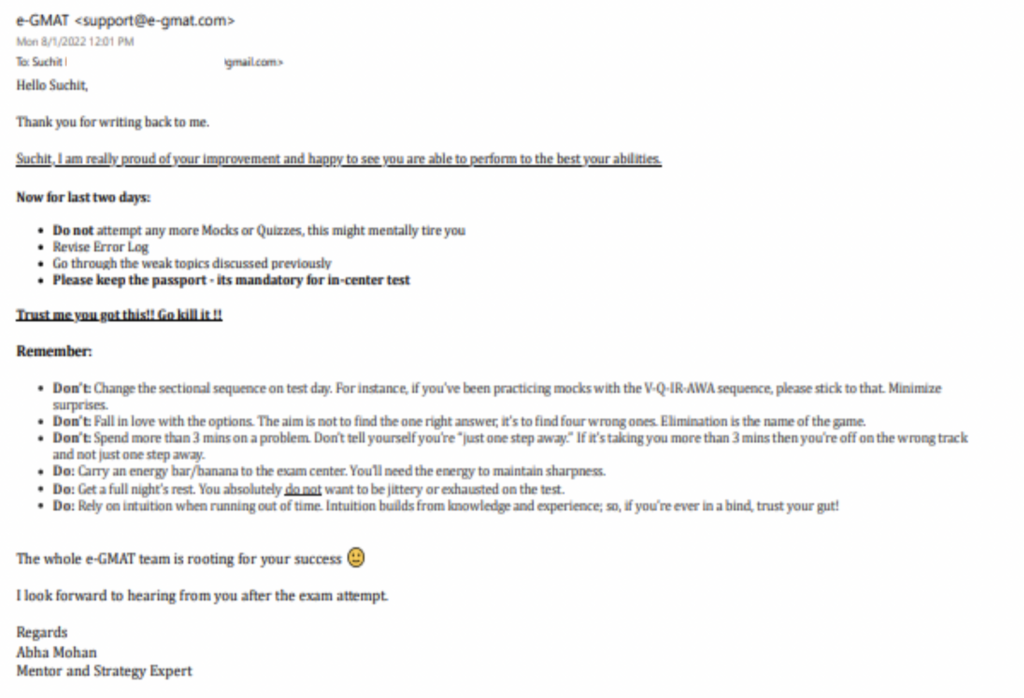
Abha: What about the date? When did you decide to book your GMAT exam? What external factors affected this decision of yours?
Suchit: After completing the entire course and two quizzes when I did not get my target score, I realized there was still a lot of scope for improvement. I decided to not book the exam until I started scoring 700. I booked the date when I finally scored 700 twice in my mocks. Besides eGMAT quizzes, I also took one official mock and scored 720. Now I was more confident and relaxed as I could maintain my scores.
Abha: What is that one thing you’d like to tell those GMAT aspirants who, like you, are aspiring to go from a 640 to a 700+ score?
Suchit: After experiencing it myself, I can tell that it’s best to take breaks. GMAT preparation can be really overwhelming. Another beneficial thing I’d like to mention is the discussion forum. You can ask any question you are unsure of in that forum; it is almost like a classroom. Students ask questions, and there are very detailed solutions. I’d suggest everyone use that platform; it’s very resourceful.


